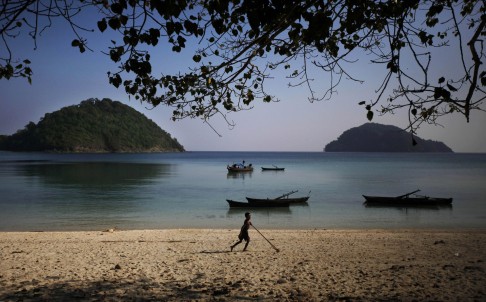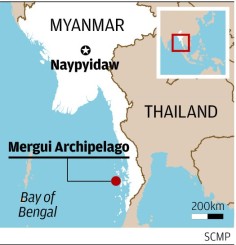Tourism threatens Moken people of Myanmar's Mergui archipelago
For centuries, the Moken people of Myanmar's Mergui islands have lived in peace and isolation - now their lifestyle is under threat from tourism
PUBLISHED : Sunday, 23 March, 2014, 5:32am
UPDATED : Sunday, 23 March, 2014, 5:32am
Associated Press in the Mergui Archipelago

A Moken youngster plays on the beach on Island 115 of the Mergui archipelago, hailed as one of Asia's last tourism frontiers but now facing an invasion by developers eager to cash in on its primeval charm. Photo: AP
Where the Indian Ocean rolls towards Myanmar's southwestern coast, a lacework of 800 islands rises, fringed with shimmering beaches on which there are no footprints.
Hornbills break a primeval silence as they flutter through the soaring jungle canopy.
Pythons slumber on the gnarled roots of eerie mangrove forests. Only rarely will you spot the people who live here - the Moken, who are shy, peaceful nomads of the sea.

The Mergui archipelago has been called the "Lost World", but outsiders have found it - first fishermen, poachers and loggers, and now developers and high-end tourists. The people losing this world are the Moken, who have lived off the land and the sea for centuries. The islands harbour some of the world's most important marine biodiversity.
They are also a big attraction for those eager to experience one of Asia's last tourism frontiers before, as many fear, it succumbs to the ravages that have befallen many once-pristine seascapes.
As the world closes in, the long-exploited Moken are rapidly diminishing in numbers and losing the occupations that sustained them for generations.
Though they are known as "sea gypsies", few still live the nomadic life and only some ageing men can fashion the kabang houseboats on which the Moken once lived.
Their island settlements are awash with trash and empty liquor bottles, signs of the alcoholism that has consumed many Moken lives.
"Before it was easy to earn money, to find products of the sea. You could fill a bucket with fish. But now many Burmese are pursuing the same livelihoods," said Aung San, resting under the trees of Island 115 with about 20 Moken men, women and children. "The life of the Moken is becoming harder and harder. Many Moken men are dying."
Asked if his people would welcome foreign visitors, the fisherman and trader replied: "We don't want to live with the Burmese or other people. We want to live by ourselves."
Myanmar's former military rulers kept the archipelago off-limits to foreign visitors until 1996. A nominally civilian government took over in 2011, but tourism remains relatively low. About 2,000 tourists visited last year - about 2.5 per island.
To date only one hotel exists, the Myanmar Andaman Resort, tucked away in a U-shaped bay on McLeod Island.
But a grab-the-best-island race is being run among local and foreign developers, with a dozen concessions already granted and others under negotiation.
A long jetty and two helicopter pads have been built and nine bungalows are under construction on the stunning but rather unhappily named Chin Kite Kyunn - Mosquito Bite Island. It is leased by Tay Za, believed to be Myanmar's richest tycoon.
The website of one development company, Singapore's Zochwell Group, advertises the island it hopes to develop as "The Next Phuket".
Zochwell is negotiating a lease to build a marina, casino, hotels and a golf course to be designed by Jack Nicklaus' company. Visitors, almost all travelling on yachts or dive boats, invariably fall under Mergui's spell.
Myanmar's minister of hotels and tourism, Htay Aung, said the islands would be promoted, but that protecting the environment and "minimising unethical practices" were top priorities.
But for the time being, the region remains a free-for-all, with no overall management plan for tourism or the environment.
Nor is there a known blueprint for the future of the Moken, described by French anthropologist Jacques Ivanoff as "the soul of the archipelago".
About 2,000 Moken are believed to inhabit the islands.
Khin Maung Htwe, who has worked with Ivanoff, said re-orienting the largely illiterate Moken from their deeply rooted lifestyles and occupations to being nature guides or hotel staff would prove difficult.
"They are innocents. They don't understand or believe in the value of education ," he said.
